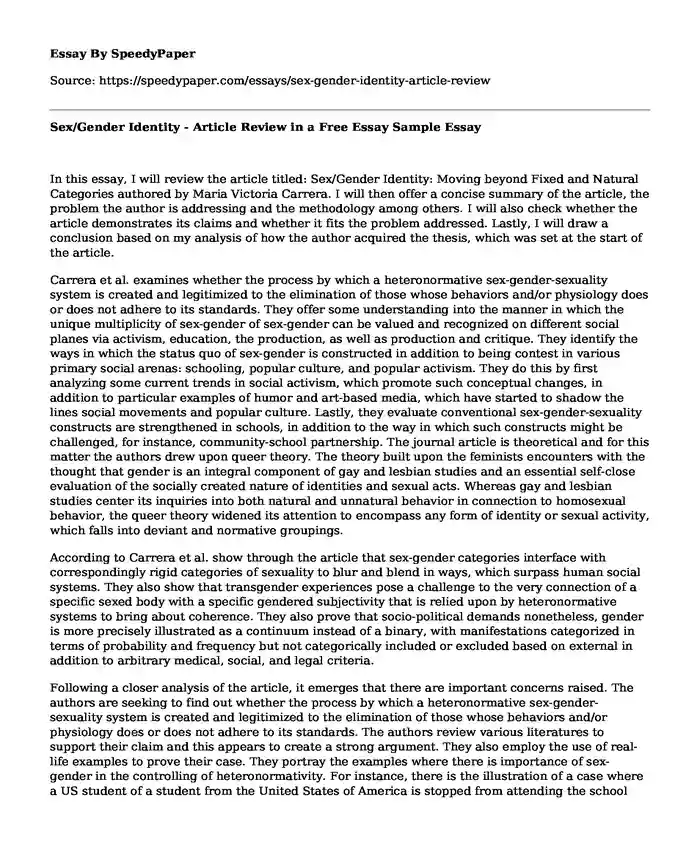In this essay, I will review the article titled: Sex/Gender Identity: Moving beyond Fixed and Natural Categories authored by Maria Victoria Carrera. I will then offer a concise summary of the article, the problem the author is addressing and the methodology among others. I will also check whether the article demonstrates its claims and whether it fits the problem addressed. Lastly, I will draw a conclusion based on my analysis of how the author acquired the thesis, which was set at the start of the article.
Carrera et al. examines whether the process by which a heteronormative sex-gender-sexuality system is created and legitimized to the elimination of those whose behaviors and/or physiology does or does not adhere to its standards. They offer some understanding into the manner in which the unique multiplicity of sex-gender of sex-gender can be valued and recognized on different social planes via activism, education, the production, as well as production and critique. They identify the ways in which the status quo of sex-gender is constructed in addition to being contest in various primary social arenas: schooling, popular culture, and popular activism. They do this by first analyzing some current trends in social activism, which promote such conceptual changes, in addition to particular examples of humor and art-based media, which have started to shadow the lines social movements and popular culture. Lastly, they evaluate conventional sex-gender-sexuality constructs are strengthened in schools, in addition to the way in which such constructs might be challenged, for instance, community-school partnership. The journal article is theoretical and for this matter the authors drew upon queer theory. The theory built upon the feminists encounters with the thought that gender is an integral component of gay and lesbian studies and an essential self-close evaluation of the socially created nature of identities and sexual acts. Whereas gay and lesbian studies center its inquiries into both natural and unnatural behavior in connection to homosexual behavior, the queer theory widened its attention to encompass any form of identity or sexual activity, which falls into deviant and normative groupings.
According to Carrera et al. show through the article that sex-gender categories interface with correspondingly rigid categories of sexuality to blur and blend in ways, which surpass human social systems. They also show that transgender experiences pose a challenge to the very connection of a specific sexed body with a specific gendered subjectivity that is relied upon by heteronormative systems to bring about coherence. They also prove that socio-political demands nonetheless, gender is more precisely illustrated as a continuum instead of a binary, with manifestations categorized in terms of probability and frequency but not categorically included or excluded based on external in addition to arbitrary medical, social, and legal criteria.
Following a closer analysis of the article, it emerges that there are important concerns raised. The authors are seeking to find out whether the process by which a heteronormative sex-gender-sexuality system is created and legitimized to the elimination of those whose behaviors and/or physiology does or does not adhere to its standards. The authors review various literatures to support their claim and this appears to create a strong argument. They also employ the use of real-life examples to prove their case. They portray the examples where there is importance of sex-gender in the controlling of heteronormativity. For instance, there is the illustration of a case where a US student of a student from the United States of America is stopped from attending the school yearbook as a result of donning a tuxedo in place of a dress. They also provide the example of the argument presented by the president of Bolivia that female hormones found in chicken increases the chances of men becoming gay. These and many more examples provided in the article justify the authors claims, therefore, making the case strong.
In my opinion, I believe that the method is appropriate. It is proven that literature review and case studies are the best qualitative methods of analyzing the psychological concerns affecting both genders, male and female. Since the issue at hand involves gay and lesbians, I believe this methodology worked instead of using empirical methods such as interviews, which would make it hard to get facts based on the fact that the area is sensitive and interviewees would shy off. I found the article persuasive since it presented the problem at the introduction and proved the case at the end.
Carrera et al. seeks to understand the process by which a heteronormative sex-gender-sexuality system is created and legitimized to the elimination of those whose behaviors and/or physiology. They are able to show that it does not adhere to the standards and go a long way to provide various suggestions, implications, or recommendations. They conclude that it is important that we widen as well as reeducate our outlook and at the same time open our eyes and specifically our minds to other realities. In my view, the authors have done a great work by coming up with a strong thesis, strongly supporting their argument with case studies and relevant theories and offering implications.
Cite this page
Sex/Gender Identity - Article Review in a Free Essay Sample. (2017, Aug 23). Retrieved from https://speedypaper.net/essays/sex-gender-identity-article-review
Request Removal
If you are the original author of this essay and no longer wish to have it published on the SpeedyPaper website, please click below to request its removal:
- Nursing as an Art and Science - Essay Example
- Literary Essay Sample on Behind the Beautiful Forevers by Katherine Boo
- Early Renaissance to Post Impressionism, Check Art Response in Our Free Essay
- Essay Sample: Production and Consumption in the Gilded Age
- The Goal: A Process of Ongoing Improvement, Essay Sample with the Book Review
- Free Essay Sample: Theories About Feminism
- Essay Sample on An HR Podcast, "Covid-19"
Popular categories





